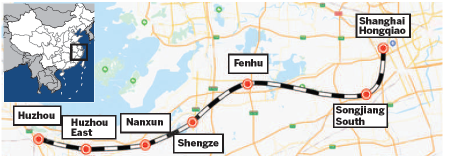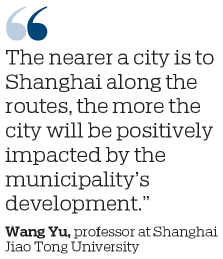Construction starts for railway west of Shanghai

The construction of the Shanghai section of the Husuhu Railway, which links Shanghai, Suzhou of Jiangsu province and Huzhou of Zhejiang province, began on Friday, marking a step forward to enhance the Yangtze River Delta integration.
Six stations are expected to be set up along the 163.8-kilometer route, along with an additional station planned for the future.
The Shanghai section, which will measure 64.8 kilometers, will have two stops: Shanghai Hongqiao Railway Station and Songjiang South Railway Station.
Three new stations will be constructed in Fenhu region and Shengze town, Jiangsu province's Suzhou, and Nanxun district, Zhejiang province's Huzhou. It will stop at Huzhou Railway Station. Construction of the railway will also leave space for another station named Huzhou East for possible future use.
The whole project is scheduled to complete construction in four years.
According to Wang Yu, professor at the school of international and public affairs at Shanghai Jiao Tong University, two transportation routes-from Shanghai to Nanjing of Jiangsu province and to Hangzhou of Zhejiang province-have been pivotal in accelerating the delta's development.
"The nearer a city is to Shanghai along the routes, the more the city will be positively impacted by the municipality's development, and the faster the city will thrive," said Wang.
"However, areas like Huzhou and Shengze are located in the region between the two lines and benefit from the municipality less."
"Following the completion of the Husuhu Railway, the integrated transportation system in the delta will be strengthened, especially leveraging the connection between Shanghai and the less developed regions," she added.
Wang noted that the railway will further promote cooperation and economic ties between Shanghai and cities within the delta and Central China.
"The railway will also drive development of the tourism industry in the region as it runs through several scenic spots, including national parks and ancient water towns," she said.
Jointly invested by the China Railway Group and the governments of Shanghai and the two provinces, the project is part of the nation's effort to enhance the integration of the delta through transportation upgrades.
In December, the central government unveiled a grand plan for further development of the delta over the next 15 years under the key concept of integration, stressing that it will elevate the region's standing in the international economy and lead China to further participate in global cooperation and competition.
The closer integration includes cross-regional transportation and the construction of the railway is included in the blueprint.
By the end of April, all three provinces-Jiangsu, Zhejiang and Anhui-as well as the Shanghai municipality in the delta had announced their implementation plans based on the outline.
As another major project to promote the integration, the renovation of the Songjiang South Railway Station has also been launched recently.
As a stop on the Husuhu Railway, the station will be expanded to become a new transportation hub for the delta. It will also spur the growth of the G60 Science and Technology Innovation Valley joined by nine cities, including Hangzhou in Zhejiang province and Suzhou in Jiangsu province.
According to the transportation commission in Songjiang district, the hub is designed to be connected by all means of transport, including trains, high-speed rails and subway.
A new station will be built and linked with the current one through a center in the middle for passenger services and train transfers.
It's estimated that the average annual passenger flow of the hub will reach about 20 million passengers.
"It will be a vital hub in the southwestern city to ease the burden on other stations in Shanghai and deepen cross-regional cooperation in the delta," said Wang.
caochen@chinadaily.com.cn























